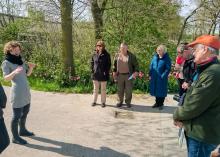Information Possibly Outdated
The information presented on this page was originally released on July 2, 2015. It may not be outdated, but please search our site for more current information. If you plan to quote or reference this information in a publication, please check with the Extension specialist or author before proceeding.
State benefits from MSU's part in world conference
STARKVILLE, Miss. -- When university personnel visit another country, the purpose is often to teach, but a visit to the Netherlands allowed some Mississippi State University faculty to learn.
Susan Seal and Laura Lemons, assistant professors in the MSU School of Human Sciences in the College of Agriculture and Life Sciences, visited this European country in late April. Along with two colleagues from the MSU Forest and Wildlife Research Center, they were there to participate in the joint conference of the Association of International Agricultural and Extension Education and the European Seminar on Extension and Education.
In addition to her duties at the conference, Seal participated in two tours. One took her to FloraHolland, the location of the world’s largest flower auction. The other took her to four organic or biodynamic farms in the country.
“The flower auction is an international trade platform, like the stock exchange for flowers. The volume and physical size are quiet impressive. The auction conducts over 100,000 transactions a day, and the warehouse facility is the size of 220 football fields,” Seal said. “I went on that tour because we might have Mississippi growers who are interested in being a part of that cooperative.”
The majority of flowers intended for the world’s florist trade pass through this auction, but Mississippi growers do not currently trade on this floor. Seal said she was interested in learning if this could be an outlet that would allow Mississippi’s green industry to take advantage of international markets.
The second tour felt more like home, but it still provided Seal with insights into farming methods Mississippi producers could adopt.
“Mississippi has a growing market for organic products, and there is a growing number of farm operations that cater to those clients,” Seal said. “The rural development tour allowed me to see a variety of technologies and marketing methods for small organic farms.”
On one of these tours, Seal saw a stable built with glass roof panels that uses multiple layers of wood chips as winter bedding. When summer comes, a layer of dirt is brought in, the cows are kept out, and the structure becomes a greenhouse.
Each of the organic farms she toured has an agritourism element. Producers there -- as in Mississippi -- have found that consumers who see where their food comes from are more likely to continue buying it from that source.
“There are two main markets for local farms: the older consumers who remember how it used to be and the younger ones who want to know where their food comes from,” Seal said.
Lemons was a conference speaker and served as a judge for an event. She came back with new insights into the global economy and the changing role of the Extension Service.
“Probably the most valuable thing I brought back from this particular conference is the knowledge of how quickly and drastically Extension is changing around the world,” Lemons said. “The content that Extension systems deliver, who delivers the education and how it is done is evidence that agricultural and Extension education is rapidly evolving to meet stakeholders’ needs.”
She said participation by MSU faculty in this conference and their membership in this professional organization keeps Mississippi, MSU and the MSU Extension Service at the forefront of agricultural and Extension education around the world.
“This conference allows us to better understand the needs of populations around the globe and how Mississippi State University might apply the knowledge and research of its experts to strengthen and enhance our own agricultural economy while doing the same for economies around the world,” Lemons said.
“Our own food safety and security depends upon the food safety and security we help build for others, so the people in Mississippi ultimately benefit from our work through this organization in a number of ways,” she said.



